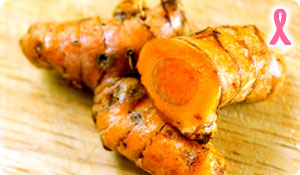
Approximately six million women in the U.S. have used hormone replacement therapy (HRT) to treat the unpleasant symptoms of menopause. However, a combination of estrogen and progestin HRT may predispose women to develop progestin-accelerated breast cancer. Many breast cancer tumors need estrogen and progesterone to grow.
In 2002, the National Heart, Lung, and Blood Institute stopped clinical trials of estrogen plus progestin HRT earlier than planned after concluding that the health risks of this combination therapy outweighed the benefits. The study found no evidence of an increase in breast cancers before four years. However, the incidence of excess breast cancers (cancers above what researchers would expect in that population) significantly increased after four years in women who had used HRT in the past.
That's where turmeric comes in. Turmeric, a common spice, may reduce women's risk of developing progestin-accelerated breast tumors following HRT.
You're probably familiar with turmeric as a primary ingredient in curry recipes. Nativepopulations in China, India and Egypt have used turmeric for its extensive healing powers for more than 5,000 years. The active ingredient in turmeric is curcumin, a biologically active phytochemical and antioxidant. Curcumin protects our cells from damage and interferes with molecular pathways involved in cancer development, growth and spread.
In a recent study, curcumin provided protection against progestin-accelerated tumors in animals, and prevented abnormalities from developing in the mammary glands.
This report supports earlier studies that suggest turmeric prevents the development and spread of cancers, including breast cancer. Turmeric treats or provides relief for a wide range of medical conditions. It's used topically for skin cancer and as an immune-suppressing agent for several other types of cancers. People who consume diets rich in turmeric have lower rates of breast cancer, prostate cancer, lung cancer and colon cancer.
While this recent study used curcumin, alternative health advocates such as Andrew Weil, MD recommend using turmeric, not just the curcumin, to take advantage of the full synergy of the active elements in botanical medicines.
If you're a postmenopausal woman who has used estrogen and progesterone HRT, you may want to discuss the results of this study with your physician.
Sources
http://munews.missouri.edu/news-releases/2009/0713-hyder-tumeric-and-cancer.php
http://www.medscape.com/viewarticle/406890
http://www.drweil.com/drw/u/id/QAA360804
http://www.cancer.org/docroot/ETO/content/ETO_5_3X_Turmeric.asp?sitearea=ETO





